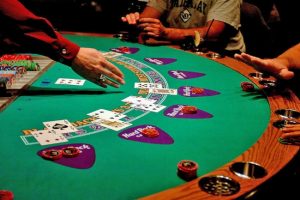 The unprecedented growth of the gambling industry is triggered by multiple factors, the most important of which is associated with economic benefits. Many states have approved commercial casino gambling because they see it as a driving power for economic growth. The greatest benefits are lower unemployment rate, an additional source of tax revenue to the state and local governments and growth in local retail sails.
The unprecedented growth of the gambling industry is triggered by multiple factors, the most important of which is associated with economic benefits. Many states have approved commercial casino gambling because they see it as a driving power for economic growth. The greatest benefits are lower unemployment rate, an additional source of tax revenue to the state and local governments and growth in local retail sails.
Increasing fiscal pressure on state budgets forced many states to have their finger on the pulse of emerging trends in the gambling industry. Many lawmakers turned to gambling to help fill a budget hole. However, it is not a straightforward task to identify the advantages and disadvantages related to legalized gambling. That explains why gambling expansion usually requires a lot of work, and a lot of time
The United States is a country largely popular with its Native American tribes. For quite some time, Indian gaming has sparked controversy, often stemming from disagreements with the states about how to share revenues or control the gaming facilities. In 1988, the United States Congress tried to establish the regulatory structure for Indian gaming in the United States by enacting the Indian Gaming Regulatory Act (IGRA).
Under the provisions of IGRA, the states are required to negotiate gaming compacts with the respective tribal nations and settle the terms and conditions, under which the tribal nations will provide their gambling services. Nowadays, disputes over Indian gaming have turned into a recurring issue. That is the case with the Seminole Tribe of Florida, which made the headlines just a few days ago.
Indian Gaming Takes Firm Grip on U.S. Gambling Industry
 The Seminole Tribe of Florida has played a key role in the development of Indian gaming in the United States. For decades, the tribe is involved in the gambling industry, opening the first tribally-owned high stakes bingo hall in 1979. In addition to that, the tribe has been a staple in the tribal gambling industry, struggling for its exclusive access to gambling in Florida.
The Seminole Tribe of Florida has played a key role in the development of Indian gaming in the United States. For decades, the tribe is involved in the gambling industry, opening the first tribally-owned high stakes bingo hall in 1979. In addition to that, the tribe has been a staple in the tribal gambling industry, struggling for its exclusive access to gambling in Florida.
In compliance with federal law, Florida had a gaming compact with the Seminole Tribe that allows the tribal nation to offer Class III games (including blackjack, roulette, slot machines and others) at its casinos. In 2010, the Seminole tribe reached a deal with then-Gov. Charlie Crist to operate banked card games at five of its casinos across the state. To make it clearer, banked card games include the presence of the house, so the players bet against the house instead of against each other. In return, the Seminoles agreed to pay the state a fair share of their gaming revenue.
In July 2015, the compact expired and the two sides had a renewal deadline of 31st October 2015. The two parties failed to reach another agreement which unleashed a series of lawsuits between Florida and the Seminoles over who has the right to operate the Class III games. In December 2015, Gov. Rick Scott rolled out a new compact with the Seminoles, which extended the tribe’s exclusive right to offer blackjack and other house-banked games at its six casinos. In exchange for the tribe’s exclusive right, the Seminoles agreed to pay the state $3 billion over seven years.
During the 2016 session, the House Regulatory Affairs Committee approved the bill aiming at ratifying the compact, but it was the Senate that delayed its vote. The measure aimed at creating a new agreement with Florida’s Seminole Tribe appeared to be stuck in the Senate. But the gaming compact has a poison pill that would allow the tribal nation to stop or reduce revenue share payments if the state violates the pact. It is important to note that the Seminoles is the largest single source of gaming revenues for the state.
As a result, the tribe accused the state of failing to negotiate in good faith on a new agreement and allowing 11 Jacksonville electronic gambling parlors. In 2017, the Seminole tribe announced that it is to file legal actions against 11 Jacksonville-area electronic gambling parlors and 15 landlords which manage or lease properties for these parlors. The Seminoles claimed the electronic gambling parlors infringed upon the tribe’s gaming compact with the state. The Seminoles took the opportunity also to warn the lawmakers that the legalization of daily fantasy sports (DFS) could violate the tribe’s exclusive rights.
The Seminoles Inches Closer to Gaming Compact Renewal
 On Friday last week, Florida senators filed a sweeping overhaul of the existing wide-ranging gambling bill filed last month. Among all other things, the proposal includes the renewal of the 20-year gaming compact with the Seminole Tribe of Florida. Under the new gaming compact, the Seminole Tribe is to pay $3 billion in revenue to the state over seven years. In return, the state should grant the tribal nation exclusive rights to blackjack and slot machines outside South Florida.
On Friday last week, Florida senators filed a sweeping overhaul of the existing wide-ranging gambling bill filed last month. Among all other things, the proposal includes the renewal of the 20-year gaming compact with the Seminole Tribe of Florida. Under the new gaming compact, the Seminole Tribe is to pay $3 billion in revenue to the state over seven years. In return, the state should grant the tribal nation exclusive rights to blackjack and slot machines outside South Florida.
On Monday, a Senate committee is to discuss the amendment at a meeting of the Appropriations Subcommittee on Finance and Tax. The new Senate bill would allow the Seminoles to add exclusive rights to roulette and craps games at their six gaming venues.
This time it is of crucial importance for the lawmakers to reach a consensus and settle the problem as that might be their last chance to do so. Last week, Casino Reports found out that more than two-thirds of the voters are in favor of a proposed state constitutional amendment on gambling that would allow people to decide the future of the gambling expansion throughout the state.
The tribe, along with a Disney company, are the main sponsors of the constitutional amendment, called the “Voter Control of Gambling Amendment”. The question is to appear on the November ballot. Supposing that the measure wins the majority of the voters, lawmakers have all the reasons to think that most of the gambling expansion plans will be scrapped.



















